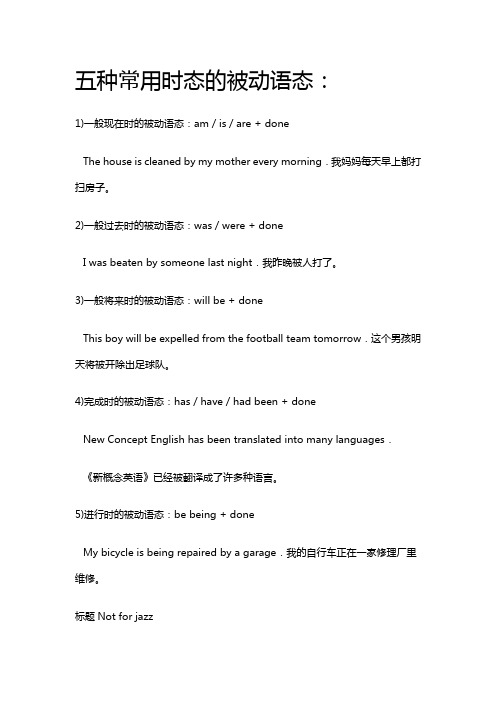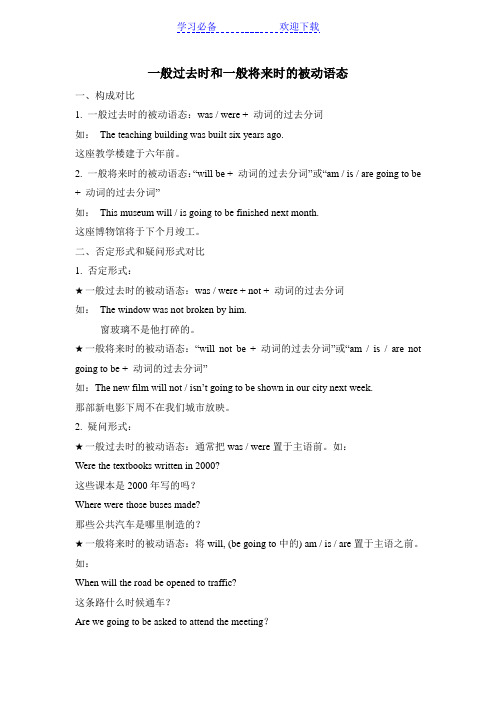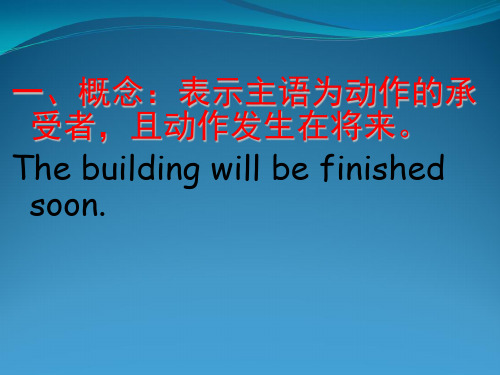一般将来时的被动语态
一般将来时被动语态优质课件

使用被动语态时,要注意动词的过去 分词形式是否正确,以及be动词的时 态和人称、数是否与主语一致。
用法
当不知道或不想说出动作的执行者时, 或者需要强调动作的承受者时,使用 被动语态。
与主动语态转换方法
01
02
03
04
将主动语态的宾语变为被动语 态的主语(受动者)。
将主动语态的谓语变为被动语 态的be动词+过去分词形式。
the party (by them).
03 被动语态基础知识
被动语态定义及作用
定义
被动语态是一种动词形式,表示主语 是动作的承受者,强调动作对象。
作用
使用被动语态可以使句子更加客观、 间接,有时也可以避免提及动作的执 行者。
基本结构与用法
基本结构
注意事项
be动词(根据时态和主语人称、数变 化)+过去分词(动词的过去分词形 式)。
将主动语态的主语变为被动语 态的by短语(有时可省略)
。
注意人称、数和时态的一致性 。
04 一般将来时被动语态详解
结构形式及特点
结构形式
will be + 过去分词,表示将来某个时间要发生的动作或存在的状态,且主语 是动作的承受者。
特点
强调动作或状态在将来发生,且主语不是动作的执行者,而是动作的承受者。
通过本课件的学习,帮助学生掌 握一般将来时被动语态的构成、 用法及在实际语境中的运用。
预期学习成果
掌握一般将来时被动 语态的基本构成和用 法。
提高学生的英语听、 说、读、写能力,尤 其是口语和书面表达 能力。
能够在实际语境中准 确运用一般将来时被 动语态。
课程结构概述
01
02
一般将来时的被动语态ppt课件

be told …
精选课件
24
Negative
• I will ( shall ) • You will • He / She / It will • We will ( shall ) • You / They will
not be told …
精选课件
25
Interrogative
• Will ( Shall ) I • Will you • Will he / she / it • Will ( Shall ) we • Will you / they
the future tense
the passive voice
shall / will + do 精选课件
be + p.p. 10
They will complete the hospital next month.
The hospital will be completed (by them) next month.
被动形式:
The carrots will be eaten by the rabbits.
被动句的一般疑问句:
Will the carrots be eaten by the rabbits?
对被动句划线部分提问:
What will be eaten by the rabbits?
被动句的否定式:
2.The construction workers are going to put down the old temple.(被动语态) The old temple is going to be pulled down.
3. We are to repair the machine tomorrow.(被动语 态) The machine is to be repaired by us tomorrow.
五种常用时态的被动语态

五种常用时态的被动语态:1)一般现在时的被动语态:am/is/are + doneThe house is cleaned by my mother every morning.我妈妈每天早上都打扫房子。
2)一般过去时的被动语态:was/were + doneI was beaten by someone last night.我昨晚被人打了。
3)一般将来时的被动语态:will be + doneThis boy will be expelled from the football team tomorrow.这个男孩明天将被开除出足球队。
4)完成时的被动语态:has/have/had been + doneNew Concept English has been translated into many languages.《新概念英语》已经被翻译成了许多种语言。
5)进行时的被动语态:be being + doneMy bicycle is being repaired by a garage.我的自行车正在一家修理厂里维修。
标题Not for jazz总结for的用法:1)为:I bought a book for you.我为你买了一本书。
2)因为:Something fell in,for I heard a splash.一定有东西掉下去了,因为我听见扑通一声。
4)适合:Not for jazz=It's not suitable to play jazz on the clavichord.古钢琴不适合演奏爵士乐。
Question:What happened to the clavichord?to后面加宾语,表示其身上发生了什么事,即动作的目标、对象。
What happened to you?你怎么了?(在你身上发生了什么事?)(1)否定句与疑问句的被动语态We don’t believe her.我们不信她的话。
一般将来时被动语态

The Future Passive Voice
一般将来时被动语态
一般将来时主动语态
1.We will plant apple trees tomorrow. 肯定式: will / shall + do 2.We will not plant apple trees tomorrow. 否定式: will / shall + not / never + do 3.Will we plant apple trees tomorrow? 一般疑问式: Will / Shall + 主语 + do? 4.Where will we plant apple trees tomorrow?
一般将来时被动语态
1.Apple trees will be planted(by us) tomorrow.
肯定式: will / shall + be + done 2.Apple trees won’t be planted(by us) 否定式: tomorrow. will / shall + not / never + be + done 3.Will apple trees be planted(by us) 一般疑问式: tomorrow? Will / Shall + 主语 + be + done? 4.Where will apple trees be planted(by us) 特殊疑问式: tomorrow? 疑问词 + will / shall + 主语 + be + done?
•【感悟高考】 •①The wet weather will continue tomorrow when a cold front_________to arrive.(全国Ⅰ) •A.is expected B.is expecting •C.expects D.will be expected •解析 when引导的时间状语从句中,用一般现 在时代替一般将来时。cold front“冷锋”。 •答案 A
一般将来时被动语态的基本结构

一般将来时被动语态的基本结构哎呀,今天咱们来聊聊“一般将来时被动语态”的事儿。
听起来是不是有点高大上?别担心,其实这玩意儿就像做蛋糕一样,简单得很,只要你知道了配方,随便玩转。
一般将来时被动语态嘛,就是在说某件事将在未来被做,通俗点说,就是“某件事情会被某人做”。
听起来是不是有点拗口?但实际上很简单。
想象一下,明天会有一场派对,你的朋友说:“蛋糕会被做。
”哈哈,没错,就是这么回事!这里的“会被”就是咱们的重点。
你看,其实用起来就是一件轻松的事儿。
你可以想象一下,当你和朋友们在一起的时候,讨论这个周末的计划。
有人说:“那个新开的餐厅会被尝试。
”哇,大家都兴奋得不得了,想象着美味的食物在那儿等着你。
这样的场景就很轻松,有趣,对吧?而且用上这个结构,听起来特专业,简直可以把人哄得开心。
再说说这结构的构成,简单明了。
你只需要把“will be”加上动词的过去分词就行。
比如说,“这个项目将会被完成”,在这里“完成”就变成了“completed”,就这么简单!就像搭积木,放一块,然后再放一块,最后就成型了。
是不是感觉特别有成就感?咱们来点实际的例子吧。
想象一下,班里有个小朋友,每次都在课上讲:“我的作业会被交!”听起来是不是很有意思?其实这就是他在为自己的未来做好铺垫。
每当你用这个句子的时候,周围的人可能会不自觉地笑出来,甚至跟着你一起说:“是啊,是啊,作业会被交。
”大家心里想着:“希望他真能做到!”有时候生活中的各种琐事也可以用这个结构来描述。
比如说,你在计划一个旅行,兴奋地说:“明天的行李会被打包。
”这时候朋友们可能会调侃你:“行李会被打包,但你会被懒惰打败!”哈哈,听起来是不是特别有趣?用这种方式,既能传达信息,又能增添幽默感,简直是一举两得。
再想象一下,在工作中,老板可能会说:“这个报告会被审核。
”这句话听上去简单,但是背后却是满满的责任感。
每个人都在想,哎呀,这报告是不是得赶紧准备好?这样一来,大家都更有动力去做事情。
一般过去时和一般将来时的被动语态

一般过去时和一般将来时的被动语态一、构成对比1. 一般过去时的被动语态:was / were + 动词的过去分词如:The teaching building was built six years ago.这座教学楼建于六年前。
2. 一般将来时的被动语态:“will be + 动词的过去分词”或“am / is / are going to be + 动词的过去分词”如:This museum will / is going to be finished next month.这座博物馆将于下个月竣工。
二、否定形式和疑问形式对比1. 否定形式:★一般过去时的被动语态:was / were + not + 动词的过去分词如:The window was not broken by him.窗玻璃不是他打碎的。
★一般将来时的被动语态:“will not be + 动词的过去分词”或“am / is / are not going to be + 动词的过去分词”如:The new film will not / isn’t going to be shown i n our city next week.那部新电影下周不在我们城市放映。
2. 疑问形式:★一般过去时的被动语态:通常把was / were置于主语前。
如:Were the textbooks written in 2000?这些课本是2000年写的吗?Where were those buses made?那些公共汽车是哪里制造的?★一般将来时的被动语态:将will, (be going to中的) am / is / are置于主语之前。
如:When will the road be opened to traffic?这条路什么时候通车?Are we going to be asked to attend the meeting?我们会被邀请参加会议吗?【趁热打铁】Ⅰ. 请选出能填入空白处的最佳选项。
高中一般将来时的被动语态

3、主句谓语动词带有复合宾语? The doctor will make him give
up smoking.
4.以下句子正确吗?
If I am given enougБайду номын сангаас time, I will go to Japan for my holiday.
The new film will shown next thursday.
Computers____in everyday life in this country before long.
A.are used B.will use C.will be used
I promise that this matter___next week.
A.will be taken care B.will be taken care of
A.are made B.are make C.will be made
三、一般将来时其他常见的被动语 态形式
1.be to be done 表示按计划、安排将要发生的被动
动作
The work will be done by Tom.
特殊用法: What is to be done next? The work is to be finished
词的过去分词
If you don't obey the rules; you will be punished.
Shall I be admitted into the stadium?
In the near future, more advances in the robot technology___by scientists.
高一一般将来时被动语态

一般将来时的被动语态概念:一般将来时表示将来某个时间要发生的动作或存在的状态,也表示将来经常发生的动作。
二、一般将来时结构:1.主语+ will (shall) + 动词原形~。
动词一般将来时,表示将要发生事(所有人称都可以用will,shall只用于I, We 后面)如:肯定式:They will finish the work next week.否定式:They won’t finish the work next week.疑问式:Will they finish the work next week?2. 主语+ be (am, is, are) going to + 动词原形~。
be going to, 表打算,准备计划将来干;表可能,有必然,通过现象来判断。
如:I’m going to see a film this evening. 今晚上我打算去看电影。
It’s going to rain. 天要下雨了。
We aren’t going to have any lessons next week.我们下周不上课。
注意: will/ shall 和be going to 结构的区别(1)对于事先经过考虑的打算、计划,应使用be going to 结构。
Why are you taking down all the pictures? I am going to repaint the wall.(2)对于事先未经过考虑的打算、计划,而是临时起意,则用will 结构。
常见于会话时,乙听了甲的话做出的反应。
Where is the telephone book? I’ll go and get it for you .(3)表示即将发生某事时,两者区别不大,多可互换。
What is going to happen? -----What will happen?be going to 一般指较近的将来,will则表示较远的将来。
- 1、下载文档前请自行甄别文档内容的完整性,平台不提供额外的编辑、内容补充、找答案等附加服务。
- 2、"仅部分预览"的文档,不可在线预览部分如存在完整性等问题,可反馈申请退款(可完整预览的文档不适用该条件!)。
- 3、如文档侵犯您的权益,请联系客服反馈,我们会尽快为您处理(人工客服工作时间:9:00-18:30)。
一般将来时的被动语态(The Future Passive Voice )一、简单回顾一般将来时和被动语态1、一般将来时一般将来时表示__________。
常与表示将来的时间状语连用。
常用的表达形式共有五种:①助动词will/ shall+动词原形1. Tomorrow will be Sunday. 明天就是星期天。
2. The rain will stop soon. 雨很快就要停了。
3. Shall we go there at five? 我们五点钟去那儿,好吗?4. Will you please open the door? 请你把门打开,好吗?②be going to+动词原形1. We’re going to meet outside the school gate. 我们打算在校门口见面。
2. Look! It’s going to rain. 瞧!快下雨了。
③用现在进行时表示将来表示位置转移的动词(如:go, come, leave, start, arrive等),可用现在进行时表示将来时。
如:1. Uncle Wang is coming. 王叔叔就要来了。
2. They’re leaving for Beijing. 他们即将前往北京。
④用一般现在时表示将来根据规定或时间表预计要发生的动作,在时间和条件状语从句中,都可用一般现在时表示将来时。
如:1. The new term starts (begins) on August 29th. 新学期八月二十九日开学。
2. If it doesn’t rain tomorrow, we will go out for a picnic. 如果明天不下雨,我们将去野餐。
⑤“be+动词不定式”或“be about to +动词原形”1. He is to visit Japan next year. 明年他将访问日本。
2. They’re about to leave. 他们就要走了。
2. 被动语态将主动语态转换为被动语态要遵循以下几个步骤:①将主动语态的宾语作被动语态的主语;②谓语动词变为“be+及物动词的过去分词”,并通过be的变化来表达出不同的时态;③主动语态的主语变为介词by的宾语,组成介词短语放在被动结构中的谓语动词之后。
(有时by的短语可以省略);例:1. Bruce writes a letter every week.→___________________________________________________________2. Li Lei mended the broken bike.→___________________________________________________________3. Lucy is writing a letter now.→___________________________________________________________4. You must lock the door when you leave.→___________________________________________________________二、一般将来时的被动语态的基本结构请根据下列句子总结和归纳一般将来时的被动语态在各种句式中的一般结构:三、一般将来时的被动语态的含义一般将来时的被动语态和它的主动语态一样表示将要发生的被动性动作。
它和被动语态一样,强调动作的承受者,不能或无须提及动作的执行者。
四、一般将来时的被动语态中易犯错误1.否定词not的位置不当例:这里的雨林不会被毁的。
【误】 The rainforest will be not destroyed here.【正】 The rainforest will not (won't) be destroyed here.【析】 not在will之后。
用缩略式won't可有效地避免此类错误。
2.简略回答的不当例: - 这里要建一座新体育馆吗- 不会的。
【误】 - Will a new stadium be put up here? - No, it won't be.【正】 - Will a new stadium be put up here? - No, it won't.【析】简略回答不需要be。
3.缺少被动语态的助动词be例:什么时候将环湖建新路?【误】 When is a new road going to built around the lake?【正】 When is a new road going to be built around the lake?【析】 is going to相当于will。
4.对谓语动作词性的忽略例:如果工厂倒闭,好几百人会失业。
【误】 Hundreds of jobs will lose if the factory closes.【正】 Hundreds of jobs will be lost if the factory closes.【析】 lose作"失去,丢失"解时,为及物动词。
建议在学习动词及短语时,留心是否及物,记住一些容易受汉语影响误用为及物动词的,如:appear, happen, take place等。
5.对所处在时间和条件状语从句中的忽略例:他说他如果为此受罚就离开公司。
【误】 He says he will leave the company if he will be punished for this.【正】 He says he will leave the company if he is punished for this.【析】在时间、条件状语从句中,应用一般现在时表示将来时。
同样,应用一般现在时的被动语态表示将来时的被动语态。
该句有if 引导的条件状语从句,所以此时应用一般现在时来表示。
又如:直到工作全部完成,你才能离开。
【误】 when the dam will be completed, the Yangtze river will be controlled.【正】 when the dam is completed, the Yangtze river will be controlled.6.将来时多种形式的重复出现例: 因要修建一座新体育馆这些房子将被拆除。
【误】 The houses will be to be pulled down for a new stadium.【正】 The houses are to be (will be) pulled down for a new stadium.【析】表示将来意义的被动结构还有:be going to be done; be to be done; will be done。
但不能重复叠加使用。
工人将于年底前付给工资。
【误】 The workers will be get paid before the end of the year.【正】 The workers will be (get) paid before the end of the year.巩固练习一、用括号里的词的适当形式完成句子。
1.Nobody ____________________ (allow) to enter the stadium without a ticket.2.Children ____________________ (not allow) to make a noise and upset the competitors. Ifthey do, they will____________________ (take away) from the stadium.3.No animals ____________________ (allow) in the stadium.4.Cheating by athletes____________________ (not excuse).they will ____________________(tell) to leave and (punish).5.No smoking ____________________ (allow). If you are discovered, you will____________________ (fine).6.二、用被动语态对下列句子画线部分提问1. They will build many new sport venues for the Beijing Olympic Games._______________________________________________________________________________ 2. Millions of people will watch the final match on TV._______________________________________________________________________________ 3. John will carry the Canadian flag at the opening of the Olympic Games._______________________________________________________________________________ 4. They will make all the flags by hand._______________________________________________________________________________ 5. Mrs. Jones will take care of your pet dog while you are away on holiday._______________________________________________________________________________ 6. The government will spend almost 100 million Yuan on this program._______________________________________________________________________________三、用括号里词的适当形式完成短文。
